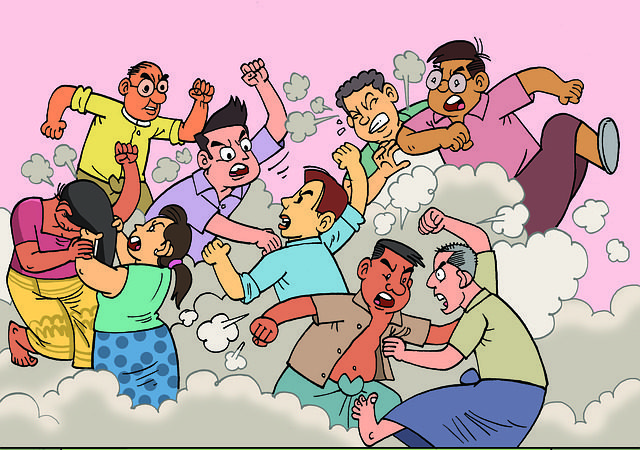Stephan Jensen is a European, a Norwegian working in London, and he can’t get his head around America’s culture wars. He excoriates both the hard left and the hard right, then shows what they have in common: the repudiation of Western civilization.
In his essay for Quillette entitled The Hard Left and Populist Right Agree on All the Wrong Things, Jensen marvels at the “absurdities” that Americans are arguing about: “Men can get pregnant, too,” “Winston Churchill is getting cancelled,” “Donald Trump is Hitler,” “Joe Biden is a communist,” “Math is racist!”
Larsen thinks the war in the Ukraine demonstrates what Americans of all stripes have in common and should make them–as it is apparently making Europeans–appreciate what Western civilization has going for it:
For all but the most utterly deluded, the actual war in Ukraine ought to serve as a powerful antidote to the self-involved pettiness of our own culture war. The reality of whole neighbourhoods destroyed by artillery and bombs reminds us of how lucky we are to live in a society characterised by peace. Witnessing Putin’s readiness to imprison thousands of anti-war protestors at the drop of a hat makes us appreciate the West’s commitment to free speech and judicial due process. Putin’s readiness to destroy a neighbouring country to impose his authoritarian ideology helps us see how unified we still are in support of democracy and national sovereignty.
More profoundly, the Ukrainian people’s willingness to risk invasion to become part of the Western world reminds us how lucky we are to be part of the West ourselves—and how much we have in common when we separate the wheat from the chaff. The contrast with Putin’s evil makes it clear that most people in the West agree on nearly everything important: democracy, rule of law, free speech, freedom of faith, individual liberty, human dignity. We never really were divided on the things that really matter. Relatively speaking, transgender bathrooms, preferred pronouns, or what you think about the 1619 Project really don’t matter at all.
But, having shown what most Americans and most Westerners have in common, Jensen then uses the Ukraine war as a touchstone to identify a deeper kind of disunity.
Both the hard left and the hard right, he says, support Putin. This reveals how both extremes are repudiating Western values.
“The real argument of the culture war was never between the hard Left and the populist Right. The real argument was about whether the Western world is something we ought to cherish, value, and fight for. ”
“In [the left’s] monomaniacal view of the world, the West is uniquely violent, exploitative, racist, and hell-bent on imperial domination. So much so that there is hardly any unfortunate event in modern history that they cannot explain with the West’s wickedness.” Thus, they oppose the West’s helping Ukraine. Meanwhile, “the populist Right was never interested in the West’s values or intellectual tradition—because this is the very tradition they hate: liberal universalism, individual liberty, freedom of speech, democracy, freedom of religion,” Jensen writes. “They cannot bear to see the West stand up to Putin because he is the one that embodies the values they really care about—not the West.”
Strong words against both progressives and conservatives. His essay, filled with supporting examples, is well-worth reading, and his challenges are worth our reflection. But let me clarify some things for our European critic.
First of all, just because many on both the left and the right are leery of the United States getting too involved in the Ukraine war does not necessarily mean that they “support Putin.” One of the things the left and the right now have in common, despite their polarization, is that are both averse to America going to war. Having learned from the Iraq and Afghanistan wars, both the left and the right have become peace parties. They may cheer from the sidelines for Ukraine’s success and may send them aid, including weapons, but they want America to tread carefully, lest we spark World War III.
As for the culture war, at issue is not just the surface controversies that Jensen finds so trivial. These are only symptomatic of deeper conflicts over “culture”–what it is, what it needs to be, what should be changed, and what should be preserved.
For example, conservatives will find it strange to be charged with repudiating Western civilization. But there are differences with perceptions of what Western civilization consists of. Does it include Christianity, which, along with classical Greece and Rome, provided the foundations for Western values? Or does Western civilization begin with the secularist Enlightenment?
Does a commitment to freedom entail primarily a belief in sexual license or in limited government? Does the institution of the family limit the freedom of its members or make it possible? Is freedom about self-government–that is, government of oneself, involving self-control and virtue–or is it about being enslaved to one’s passions?
Does freedom of religion mean the destruction of religious institutions or forbidding the presence of religion in the public sphere, or does it mean removing restrictions on religious institutions and freeing religious people to live out their convictions in the public sphere?
All sides might agree on the Western notion of human rights, but questions remain: Do children in the womb have human rights, or only their mothers?
Does democracy mean that the people rule? If so, how is that different from “populism”? Or does democracy mean that individuals are part of a collective to be ruled by an expert elite? If democracy hinges on citizens voting, doesn’t that require the security of ballots and safeguards to the voting process? Or are such safeguards anti-democratic?
Larsen is right that Americans have more in common than they sometimes realize. But while we agree on principles, our divisions are over what those principles mean and how they are to be applied. The result is not a civil war, but a culture war.
Image by Mote Oo Education from Pixabay














